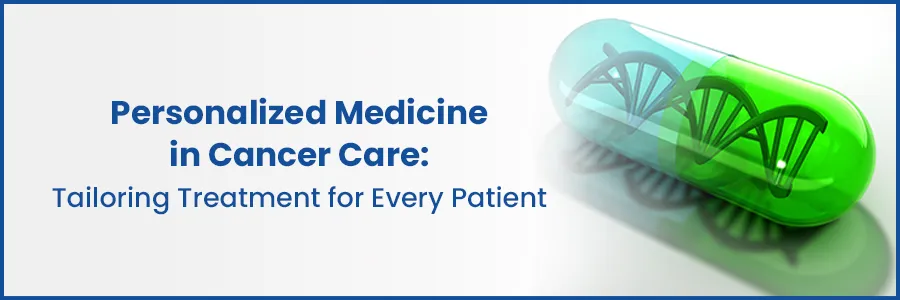- Cardiology 84
- Dermatology 45
- Endocrinology 33
- ENT 16
- Fertility 190
- Gastroenterology 78
- General-Medicine 81
- Gynecology 80
- Hematology 19
- Infectious-Diseases 33
- Neurology 52
- Oncology 34
- Ophthalmology 23
- Orthopedics 69
- Pediatrics 31
- Procedure 23
- Public-Health 144
- Pulmonology 59
- Radiology 8
- Urology 68
- Wellness 161
- Woman-and-child 77

What is Personalized Medicine for Cancer?
In the fight against cancer, something exciting is happening: doctors are finding new ways to treat each person's cancer uniquely. This approach is called personalized medicine. Instead of using the same treatment for everyone, doctors create treatment plans based on individual differences. In this blog, we'll explore personalized medicine in oncology, its benefits, how it works, and its impact on cancer patients.
Typically, doctors use similar treatments for people with the same type of cancer. But everyone is different. Personalized medicine aims to understand these differences. It considers your genes, lifestyle, and health to determine the best treatment for you.
The Cool Part
Doctors look at your genes to help you decide on the best treatment. They do this by testing your DNA, which is like your body's instruction manual. By reading it, doctors can learn a lot about your cancer. This helps them choose treatments that will work better for you.
How Personalized Medicine Works?
First, doctors take a small sample of your DNA. They then examine this sample to identify any unique aspects of your genes that could influence your cancer. Once they know this, they can choose treatments that target those specific characteristics. It's like using a secret code to find the right key to stop the cancer.
Why Personalized Medicine is Awesome?
- Better Treatment: Personalized medicine makes treatments more effective because they are tailored to you, increasing the chances of stopping the cancer.
- Fewer Side Effects: Personalized medicine aims to avoid side effects by targeting only the cancer cells, not the healthy ones.
- Smarter Choices: Instead of trying multiple treatments to see which one works, doctors can select the best treatment right away based on your genes.
- Improved Well-Being: Personalized treatment plans increase the likelihood of feeling better and maintaining a good quality of life during and after treatment.
- Early Detection: Personalized medicine can help detect cancer early. By examining your genes, doctors can determine if you're at higher risk for certain cancers, allowing for more frequent monitoring and early detection.
Challenges and What's Coming Next?
Personalised medicine is fantastic, but there are challenges. DNA testing can be expensive, and interpreting results can be complex. Additionally, not all cancers have unique genetic targets.
However, scientists are working on solutions. They are developing cheaper and easier testing methods and discovering new genetic insights. With ongoing research, more people will benefit from personalised medicine in the future.
Conclusion
Personalised medicine for oncology involves creating a unique plan just for you. Doctors use your genes and other personal information to find the best treatment. This approach ensures the therapy works well and minimises side effects. Although there are challenges, the future looks bright. With more research and better technology, personalised medicine could improve the lives of many cancer patients.
Frequently Asked Questions
Personalized medicine means customizing cancer treatment based on your individual characteristics like genes, lifestyle, and health to make it more effective.
Doctors analyze your DNA to identify unique traits of your cancer. They then choose treatments that target these traits, increasing the chances of success.
Personalized treatment is tailored to you, improving outcomes and reducing side effects. It's smarter, more effective, and can enhance your quality of life.
Genetic testing for personalized medicine can be costly, but ongoing research aims to make it more accessible over time.
Not all cancers have well-defined genetic markers, so personalized treatments may be limited to specific types of cancer.
Genetic testing might sound complex, but your healthcare team will guide you through the process and explain the results.
Yes, genetic markers can identify individuals at higher risk of certain cancers, enabling early detection and preventive measures.
Personalized medicine holds the promise of better outcomes and improved quality of life. Ongoing research aims to refine and expand its application.

- Cardiology 2132
- Dermatology 168
- Endocrinology 135
- ENT 97
- Fertility 217
- Gastroenterology 232
- General 478
- General-Medicine 1685
- Gynecology 169
- Hematology 85
- Infectious-Diseases 208
- Neurology 207
- Oncology 345
- Ophthalmology 65
- Orthopedics 187
- Pediatrics 83
- Procedure 72
- Public-Health 209
- Pulmonology 126
- Radiology 13
- Second Opinion 311
- Urology 294
- Wellness 600
- Woman-and-child 447
- Others 10217
Related Blogs
If you have any questions, please fill out the enquiry form or call us, and we will get back to you promptly.
040-68334455